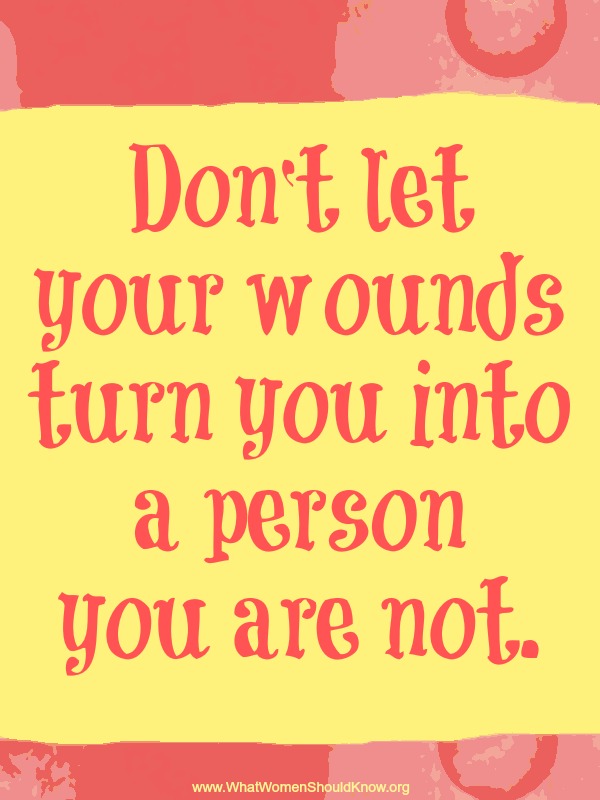UPDATE: This post was originally published almost two years ago and it’s a message that’s so dear to my heart. It became the inspiration for my latest book ~ What Women Should Know About Letting It Go. For more info, please see the Letting It Go tab just above this post.
You don’t have to live a life filled with guilt and shame and regret. Your mistakes don’t define you. You are so much more than that bad choice, that poor response, that rebellious moment, than any or all of your failures and mistakes. Past, present, or future.
The truth is that every one of us is sinner, in desperate need of a Savior. It’s why Jesus came. But it’s also true that “anyone who belongs to Christ has become a new person. The old life is gone; a new life has begun!” (2 Cor 5:17)
This is why Jesus died on the cross — He paid for our sins and failures and mistakes. He took the penalty for us.
“If we claim we have no sin, we are only fooling ourselves and not living in the truth. But if we confess our sins to Him, He is faithful and just to forgive us our sins and to cleanse us from all unrighteousness.” (1 Jn 1:9)
Since Jesus already paid for our sins, He’s not making us pay.
So why are we?
“This is how we set our hearts at rest in His presence: If our hearts condemn us, we know that God is greater than our hearts, and He knows everything.” (1 John 3:20)
Everything.
He understands our weakness, our frailty. He knows our hearts. He sees us for who we really are — who He created us to be. And He loves us unconditionally.
This week in our Virtual VBS for GrownUp Girls, we’re reading John 10-11. In John 11, we find two familiar figures who are most often remembered for their mistakes … down through the centuries, their names have become synonymous with their momentary failures. And yet in this one chapter, we see that they were so much more.
Jesus knew them for who they really were. It’s time we did, too.
First there’s Thomas. “Doubting Thomas.” The skeptic who once said, “Unless I see the nail marks in His hands and put my finger where the nails were, and put my hand into His side, I will not believe.” (John 20:25) Through the centuries, many have condemned him for his lack of faith, while others have sympathized and rationalized why he was — “understandably” — slow to believe.
But that was just one faithless moment.
In John 11:1-16, the other disciples try to discourage Jesus from returning to Judea. They’re afraid and unwilling to go, even to help a friend like Lazarus, because the Pharisees might try to stone Jesus again. But Thomas puts an end to the discussion by boldly declaring that he’s willing to follow Jesus anywhere, even to His death: “Let us also go, that we may die with Him.”
And he meant it. Because that’s just what he did — he went, and took the other disciples with him.
Thomas had real courage. Real faith. Real commitment to the cause of Christ. He led by example. And he followed up his words with his actions.
Even in that instance when his faith failed him — however briefly — we see that he was afterward quick to humble himself, quick to repent and believe. Thomas was not defined by his mistakes. Because of Jesus, he was so much more.
Then there’s Martha. Every Christian woman knows the story of Martha — the woman who was so busy doing FOR Jesus that she neglected to spend time WITH Him. The busy woman bustling around the kitchen, caught up in the cares of this life, nagging and whining and complaining — instead of taking the time (like her sister Mary) to sit at Jesus’ feet.
Sometimes the way we tell the story, you’d think Mary was Cinderella and Martha, one of the ugly stepsisters.
But in John 11:17-43, it’s a different scene. Mary is the one whose faith fails her, whose emotions (anger, hurt, frustration, fear and despair) get the better of her. Mary only comes to Jesus when He calls for her.
But Martha is seeking Him; she’s standing out there on the outskirts of town, waiting for Him. And when He asks her if she trusts Him, if she believes in Him, she answers with one of the most powerful, unequivocal declarations of faith in all the Gospels.
She may not have known what He was going to do (vs 39), but she knew who He was: “Yes, Lord, I have believed [I do believe] that You are the Christ (the Messiah, the Anointed One), the Son of God, [even He] Who was to come into the world. It is for Your coming that the world has waited.” (11:27 AMP)
In spite of her bad attitude on that one “horrible terrible rotten no-good day,” Martha was a woman of faith. A woman of strength and character and dignity and integrity. We see that throughout this story. She was not defined by her past mistakes. Because of Jesus, she was so much more.
What about you?
Will you let your mistakes and failures define you? Or will you choose to believe what Jesus says about you — will you choose to see yourself as He sees you?
Flawed, imperfect, but deeply beloved. His priceless masterpiece, His greatest creation, His most precious possession. (Eph 2:10, 1 Peter 2:9) Gloriously individual and unique. Becoming a beautiful reflection of Him.
Instead of wounds or trials or tragedies, instead of failures and mistakes, let love – His for you and yours for Him — define you today. (John 13:35)
Don’t Forget This Week’s Assignment:
If you’re participating in Summer in the Son — our online study of the Gospel of John:
Read John Chs 10-11. Take your time and really immerse yourself in the Word. (For tips on how to get the most out of your Bible study time, see Five Simple Ways to Focus on the Words You Read.)
Memorize John 10:9.
…………..
Today’s Question: How can we get past our past? What can we do — on a practical level — when memories of our failures and mistakes seem to haunt us? How can we let them go and leave them behind?










